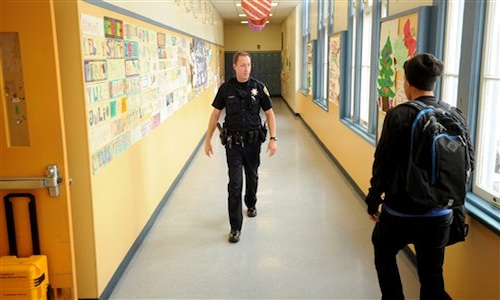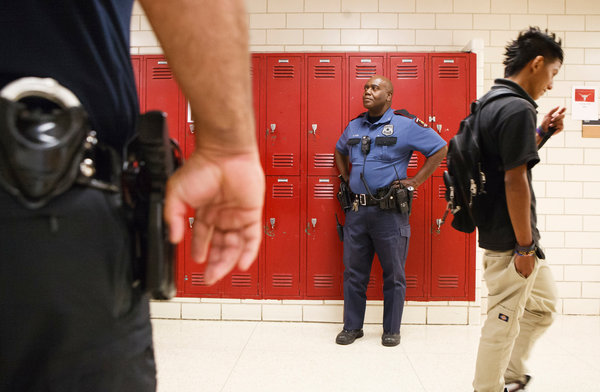Keeping Your School Hallways Safe

Twenty-eight innocent students and staff members were killed in 44 different U.S. school shootings in the 14 months following the tragedy at Sandy Hook. Many schools have implemented school resource officer or security officer programs to help protect students and staff, but faced with limited resources, leading schools are also turning to automated software solutions like Awareity’s TIPS (Threat assessment, Incident management and Prevention Services), a web-based risk and prevention platform. These software solutions offer tools that empower students to anonymously share information, and allow SROs and school administrators to identify potential threats, investigate concerns thoroughly, and ensure their school environment is as safe as possible.
It is still dark out when Scotty Hernandez pulls into the Bradley Central High School parking lot in Cleveland, Tennessee.
Hernandez and his team of School Resource Officers (SRO) are up and on the job way before many of the students they strive to keep safe have even rolled out of bed.
On a typical day, the SROs within the Bradley County School District will arrive early at their schools to check their e-mail and follow up on any ongoing student issues with administration. A quick round of the school buildings to check all exterior doors and then they position themselves near the front entrances to greet all students and staff as they enter the buildings.
“We want the SROs to get to know all of our students. And we want students to know us,” says Hernandez. “If we develop that ongoing rapport, hopefully they will trust us enough to come to one of us with concerns or problems they are having at school.”
Now that the school day has begun, the security officers will continuously patrol the hallways, restrooms, parking lots, gyms, cafeterias, etc. and try to remain highly visible to students throughout the day.
If you took a poll across the United States, most people probably have a basic understanding of what an SRO is: a law enforcement officer who works in a school. And while the duties of SROs can vary from one school community to another, their responsibilities do include issuing citations, taking actions against unauthorized persons on school property, responding to off-campus criminal activities that involve students, and of course, serving as first responders in the event of an emergency situation at the school. But outside of their basic sworn duty to protect, what else does an SRO do?
 The SROs within Bradley County Schools will often be approached by students that just want to talk to someone about a problem they are experiencing at home or school. Parents may contact the school SRO if they suspect their child is using drugs or alcohol. The SRO fills the role of confidant; a caring, trusted adult in the school building who students can come to and who will work with them to find positive and proactive solutions.
The SROs within Bradley County Schools will often be approached by students that just want to talk to someone about a problem they are experiencing at home or school. Parents may contact the school SRO if they suspect their child is using drugs or alcohol. The SRO fills the role of confidant; a caring, trusted adult in the school building who students can come to and who will work with them to find positive and proactive solutions.
The SROs can also help solve conflicts between peers (things like bullying, cyberbullying, teasing, disorderly behavior, etc.). Guidance counselors will often pull in an SRO to assist in conflict mediation efforts as well.
In addition, SROs work to educate students in crime prevention and personal safety. They often speak in health, government, sociology, or psychology classes and also help develop and expand community justice initiatives for students. SROs help prevent future violence through education.
SROs are also key players in helping identify and assess the school environment, implement physical changes that may reduce or prevent crime at school, and assist in developing school policies and safety plans.
Sounds like a great asset for every school, right? So, why is the decision to hire a school resource officer such a big debate at many schools?
FUNDING—the big sticking point. The annual cost of hiring an SRO—in salary, benefits, training and equipment—averages $75,000. Having an officer at school events (sporting events, etc.) can even qualify as overtime. And as stated above, if the community, and more important the administration and staff at your school, don’t understand the SROs’ role, the validation can be even tougher. Educating staff, faculty, students, and parents on the SRO’s job responsibilities, daily activities, etc., and encouraging them to reach out and connect with the SRO at their school can help build ongoing rapport and support. It is difficult to show clear return on investment in regards to prevention, but every parent and staff member would agree that the cost of saving a student’s life is priceless.
Expectation of law enforcement and police departments may also often differ from the expectations the administration and school staff have for an SRO. To help eliminate confusion, schools should have a clearly defined memorandum of understanding. It is important that all duties are outlined, and schools may even need to implement training for school staff on the use of their SRO. Inviting staff to interact with the SROs can help create lasting relationships and trust.
Another challenge many schools face is training. SROs are mandated to receive ongoing training, tactics training, etc. Finding time for the SROs to attend this training (and ensuring a back-up officer is available to fill in) can be difficult.
And then there’s the paperwork. SROs will be writing reports, interviewing students, taking statements, documenting cases, etc. They seem to face endless piles of paperwork and lack the time in the day to complete it.
 To help improve student safety and address challenges with limited funding and resources, both Bradley County Schools in Tennessee and Ankeny Community Schools in Iowa have implemented Awareity’s TIPS. The TIPS platform is successfully being used in multiple school districts across the United States to more effectively identify, prevent, and intervene in threatening behaviors. TIPS provides an easy online solution for all students, parents, faculty, staff, and community members to safely (and anonymously or confidentially) report concerning behaviors, suspicious incidents, and general safety/security concerns to the right school staff, school security officers, and SROs.
To help improve student safety and address challenges with limited funding and resources, both Bradley County Schools in Tennessee and Ankeny Community Schools in Iowa have implemented Awareity’s TIPS. The TIPS platform is successfully being used in multiple school districts across the United States to more effectively identify, prevent, and intervene in threatening behaviors. TIPS provides an easy online solution for all students, parents, faculty, staff, and community members to safely (and anonymously or confidentially) report concerning behaviors, suspicious incidents, and general safety/security concerns to the right school staff, school security officers, and SROs.
SROs and security officers can’t be in more than one place at one time, so TIPS allows students to share concerns on what they have witnessed, helps raise awareness among students, and encourages them to be active participants in their school’s safety. If a student comes to a staff member with a situation, they are encouraged to make an incident report online, so it is documented and all details are easily accessible. With limited funding available many schools have to make due with one (or no) resource officer across many locations, so TIPS creates a “virtual” security officer that students can confide in.
SROs and other staff members can also take advantage of the incident management platform to keep track of that dreaded paperwork, ranging from daily log activities, custody issues, and juvenile citations. TIPS makes it simple to view and track who has done what regarding any particular incident or student. SROs can log their daily activities and share any information they feel is relevant with personnel at other schools in the district, or involve local law enforcement if necessary. TIPS is saving SROs and security officers valuable time in their busy schedules, as they can more easily review related incidents involving students and securely access information all in one central location.
“Ankeny Community Schools is just getting started with TIPS,” said Tabetha Rabenberg, a principal in Ankeny Schools and President of the Iowa School Resource Officers Association, “but the potential for this tool is huge. We are enhancing the way we communicate with our students and it makes it so easy to share information across the district.”
Hernandez of Bradley County is also happy with the new platform. “At the end of the day, if I want to see what one of our SROs was up to…I can login and see an overview of their activities. When budget time rolls around, it will be easy to show how integral they are to our school community. They are saving lives.”
Katie Johnson
VP of Marketing and Client Services
Awareity
Keeping Your Schools Safe | On-Officer Video | National Police Week | INTERPOL Washington and Nlets | Medal of Valor Nominations
